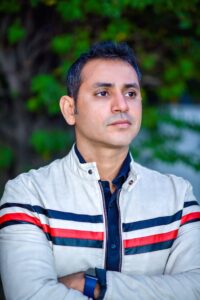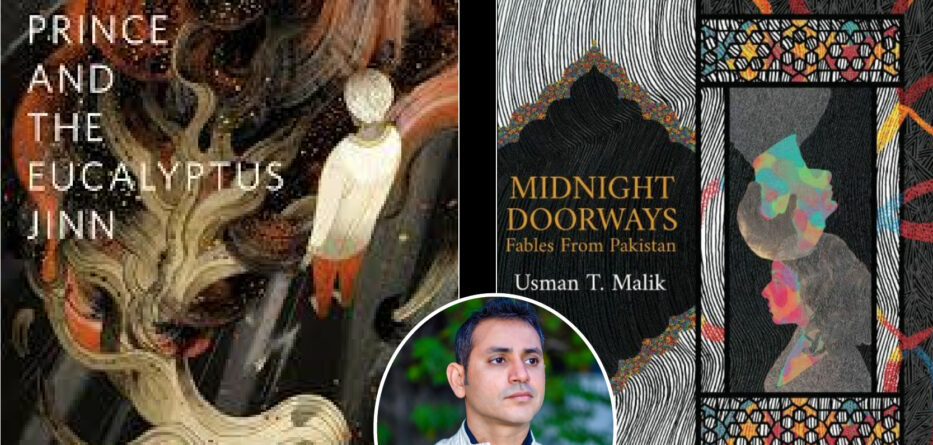You have been writing for several years — since 2012 — if I’m not mistaken, even before your debut book ‘Midnight Doorways’. How has the journey been?
Like most writers, I have been closet-writing since I was a child. My first publication was a Letter to the Editor of ‘Children’s Pakistan’ when I was seven perhaps. I remember running around the house, waving the paper in everyone’s face. My writing journey began then, but growing up in Pakistan in the 90s wasn’t superbly conducive to pursuing a career in the creative arts — there was little precedent and I came from a very non-literary family. So, I went to med school and became a doctor. It wasn’t till 2012 or so that I seriously began contemplating professional writing.
Since then, I have published around a dozen and a half short stories and a novella. I have been fortunate that this meagre output has managed to find a faithful readership.
With your debut collections, you appeared to have blended together a rare amalgamation of sci-fi, fantasy, along with a touch of history and prevailing political conditions. It’s a herculean feat—so do tell us how you managed to do this.
I’ve been drawn to wonder tales and horror since I was a child. I grew up immersed in Urdu magazines and books featuring superheroes like Umroo Ayyar, Amir Hamza, Chan Changloo and others. I found the moralistic ‘serious’ children’s magazines pedantic and boring. At the same time, I was mesmerized by Urdu poetry and ghazals; Sufi ideas; the idea of a lost past, knowledge of a broken present, and uncertainty about the future. A friend recently joked that only two kinds of desis become poets: One who is wounded in the heart and another wounded in the head. We, children of colonialism and Partition, have been hurt in both. Is it any wonder our literature stands at the threshold of many midnight doorways?
 Were there particular challenges that you faced when publishing Midnight Doorways?
Were there particular challenges that you faced when publishing Midnight Doorways?
Well, the big one was that I had never published a book before. Midnight Doorways was envisioned, designed, illustrated, proofread, and printed within Pakistan as a hybrid project between Kitab (Pvt) Ltd. and myself. While writing may be mostly art, publishing is nearly all business. You have to switch mental gears and putting that hat on was daunting: I had to oversee every step of production including commissioning artwork and making final calls on design decisions. Couple all that with the myth that Pakistanis do not read and I had a very uncertain, expensive task on hand. Happily, Midnight Doorways pretty much smashed expectations, selling out locally and internationally very quickly. We put out a second print run within six months of publication, which is huge for an illustrated book published in Pakistan.
Be it space traveller’s mother suffering from dementia, or re-imaginings of history, you appear to delve into raw human emotions, and yet place them in a wholly new and imaginative context. Does your writing possess a hidden social messaging for the world, or do you wish for it to be an escape for readers?
As writers more eloquent than I have noted: No writing is bereft of political meaning. Making art is a sociopolitical act and all stance (including taking no stance) is political. When I write, I try to write stories that only I could write, that please me, the idea of which thrills me. Juxtaposing strange ideas and themes that no one has tried gives me great satisfaction. If I’m not intrigued by my stories, the reader won’t be either. You’re welcome to escape into my fictions and you might have a blast doing it, but you’ll also be discomfited, frightened, uneasy. And hopefully, occasionally, you’ll fall in love.
You wrote a feminist retelling of Maruf The Mochi From A Thousand And One Nights. What other famous novels, with men at the center, would you like to retell in a similar fashion and why?
I’m impressed that you read so much of my stuff in a short period of time. I was not interested in fairytale retellings (although I’d read a lot of them) until I read stories by Kelly Link and Karen Joy Fowler at the Sycamore Hill Writing Workshop. Kelly’s idea of the ‘fairy tale-adjacent’ retelling intrigued me and I wanted to try my hand at it. But why should I do it with a Hans Christian Andersen or Brother Grimms story, I thought Why not redo one from my part of the world? I loved Maruf the Mochi’s story as a kid but when I read the adult version, its misogyny irked me. I decided to go after it and the result was City of Red Midnight: A Hikayat. I enjoyed the process a lot. I do think I will try my hand at it again someday, but I don’t know if I have specific themes or stories in mind.
What advice would you have for aspiring writers?
Write with passion, joy, love, and generosity of spirit. Write what you have always wanted to see on the page but couldn’t find. Write to remake the world in your own image.
An aspiring author, journalist and history graduate, Lakshana Palat has written stories for three anthologies ‘When They Spoke’, ‘Mocktales’ and ‘Readomania’s Book Of Romance’. In 2018, she published her first book, ‘The Final Word’.











